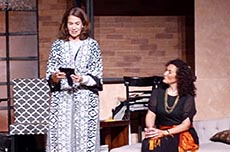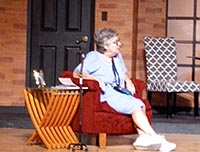
 ** Although Charles Busch wrote “The Tale of the Allergist’s Wife” in 2001, the show feels as if the action were taking place at least ten or twenty years earlier. It is meant to be a comedy, and it is indeed funny in spots, but the story needs a bit of a rewrite to suit a modern audience. The laughs take place when we witness the clash of a relatively ordinary New York Jewish family and the injection of a free spirit in the person of Lee Green (Aimee Kleiman), the former Lillian Greenspan. And while the action throughout is tied together by Lee’s charisma and influence, the plot contains a few too many course changes that don’t work. These are not “twists and turns” in the conventional sense but, rather, the function of a somewhat disjointed script. For example, by the end of the first act, we have no clue where things are going.
** Although Charles Busch wrote “The Tale of the Allergist’s Wife” in 2001, the show feels as if the action were taking place at least ten or twenty years earlier. It is meant to be a comedy, and it is indeed funny in spots, but the story needs a bit of a rewrite to suit a modern audience. The laughs take place when we witness the clash of a relatively ordinary New York Jewish family and the injection of a free spirit in the person of Lee Green (Aimee Kleiman), the former Lillian Greenspan. And while the action throughout is tied together by Lee’s charisma and influence, the plot contains a few too many course changes that don’t work. These are not “twists and turns” in the conventional sense but, rather, the function of a somewhat disjointed script. For example, by the end of the first act, we have no clue where things are going.
The production, directed by Steve Scott, takes place within a Jewish household on Manhattan’s Upper West Side. Marjorie Taub (Julie Stevens) is reminiscent of the bored housewife, whose children have flown the nest, and she does not know what to do with herself. She has a very fine education, especially when it comes to her knowledge of German philosophers, and at one point in her life, she has penned a novel. She is depressed in that she feels her life has gone nowhere and that she is being condemned to mediocrity and awkwardness in everything she says and does. Her recently retired husband is the allergist Dr. Ira Taub (Peter G. Leondedis). He is the most self-possessed of all the characters and consults with those in his former practice while doing some volunteer medical work on the side. Marjorie’s mother Frieda (Amy Ticho) is the kvetchy Jewish mother, who loves to talk about her aches, pains, and B.M.s. (She’s a wonder if you like toilet humor.) Then there is Muhammed (Ravi Kalani) who serves as both the doorman and the superintendent of the building.
The most compelling character in the story is that of Lee who seems to have seen the world, and everyone finds her fascinating. Charming and knowledgeable, she accidentally drops in on Marjorie, who is so depressed that she won’t get out of her bedclothes. But it is the rekindling of their friendship that changes everything. Lee is apparently acquainted with all sorts of famous people and has traveled to many interesting places throughout the globe. She is constantly dropping names and eluding to past experiences: whether these things are real or imaginary is anyone’s guess. Whereas Marjorie lives through books and intellectualism and Ira lives through his career, Lee actually does things in the world. Her magnetic personality and ebullience inject pizzazz into everyone’s plain and humdrum life, as the characters vicariously live the more glamorous aspects of themselves through her.
Inasmuch as this intermix of characters may seem funny initially, there is something lacking. What becomes problematic is when the characters sometimes don’t seem to know their own mind. The story is also meant to appeal to a mostly Jewish audience, but times have changed. I found Frieda’s lines to be very dated as they relate to Germany and the Holocaust as well as her lines about the United Negro College Fund. It’s simply not funny (as it was intended to be), and her monologues add nothing to the plot except the introduction of unwarranted prejudice. The show is also somewhat too politically explosive through the lens of today’s politics, perhaps making it less enjoyable than if it were to be watched in less troubled times.
Most importantly, the accidental meeting of Lee and Marjorie in Marjorie’s condominium building seems strange, but even stranger is that she and Ira take on Lee as a permanent guest who stays in her guest bedroom—but only after her husband and the doorman Muhammed question if she is actually a real person and not a figment of Marjorie’s imagination. There are moments when it seems like the role of Muhammed is an add-on, and he’s in the room when he shouldn’t be. Above all, the ending is weird having to do with Lee (who is Jewish) supporting a questionable humanitarian organization. To my mind, this does not necessarily mean that she is necessarily anti-Semitic or malicious; rather, she may simply be the type of person who may not want to be bogged down in knowing about politics or in learning (uncomfortable) details that may likely interfere with her established point of view. Her intent may not be to be deceptive or deceitful even when her opinions and actions go against the grain of all of the other characters.
The set design by Wayne Mell works nicely for this show, although among other things, there are a few anachronisms. The most obvious one is the use of a more modern laptop computer than what was available in 2001.
Although this play once opened to critical acclaim, it nevertheless feels much too anachronistic and dated. More to the point, the moment that things go down one track, something changes—and it goes down a different track that might be more of a diversion than anything else.
“The Tale of the Allergist’s Wife” is playing through November 19, 2023at the Skokie Theatre, 7924 Lincoln Avenue, in Downtown Skokie.
General admission tickets – $38
Seniors and students – $34
 Performance schedule:
Performance schedule:
Fridays and Saturdays at 7:30 p.m.
Sundays at 2:00 pm
One Wednesday matinee on November 15 at 1:30 p.m.
For more information or to purchase tickets, go to https://skokietheatre.org/ or call the box office at 847-677-7761.
To see what others are saying, visit www.theatreinchicago.com, go to Review Round-Up and click at “The Tale of the Allergist’s Wife”






More Stories
“Disney’s The Little Mermaid”
“A Beautiful Noise : the Neil Diamond Musical”
“Annie”